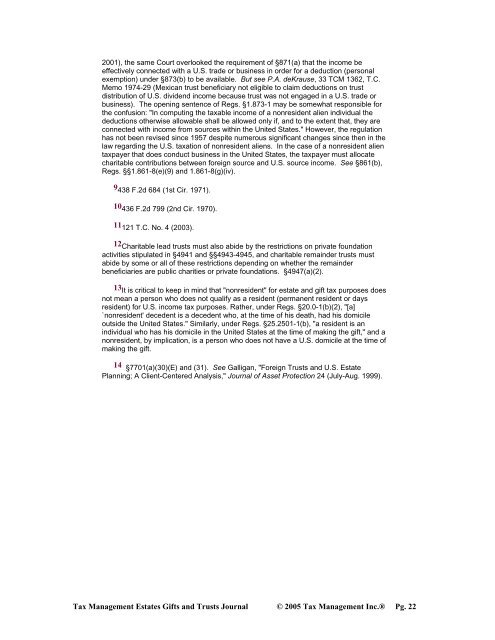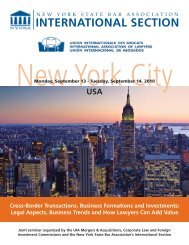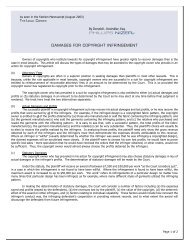International Charitable Giving And Planning ... - Phillips Nizer LLP
International Charitable Giving And Planning ... - Phillips Nizer LLP
International Charitable Giving And Planning ... - Phillips Nizer LLP
You also want an ePaper? Increase the reach of your titles
YUMPU automatically turns print PDFs into web optimized ePapers that Google loves.
2001), the same Court overlooked the requirement of §871(a) that the income beeffectively connected with a U.S. trade or business in order for a deduction (personalexemption) under §873(b) to be available. But see P.A. deKrause, 33 TCM 1362, T.C.Memo 1974-29 (Mexican trust beneficiary not eligible to claim deductions on trustdistribution of U.S. dividend income because trust was not engaged in a U.S. trade orbusiness). The opening sentence of Regs. §1.873-1 may be somewhat responsible forthe confusion: "In computing the taxable income of a nonresident alien individual thedeductions otherwise allowable shall be allowed only if, and to the extent that, they areconnected with income from sources within the United States." However, the regulationhas not been revised since 1957 despite numerous significant changes since then in thelaw regarding the U.S. taxation of nonresident aliens. In the case of a nonresident alientaxpayer that does conduct business in the United States, the taxpayer must allocatecharitable contributions between foreign source and U.S. source income. See §861(b),Regs. §§1.861-8(e)(9) and 1.861-8(g)(iv).9 438 F.2d 684 (1st Cir. 1971).10 436 F.2d 799 (2nd Cir. 1970).11 121 T.C. No. 4 (2003).12 <strong>Charitable</strong> lead trusts must also abide by the restrictions on private foundationactivities stipulated in §4941 and §§4943-4945, and charitable remainder trusts mustabide by some or all of these restrictions depending on whether the remainderbeneficiaries are public charities or private foundations. §4947(a)(2).13 It is critical to keep in mind that "nonresident" for estate and gift tax purposes doesnot mean a person who does not qualify as a resident (permanent resident or daysresident) for U.S. income tax purposes. Rather, under Regs. §20.0-1(b)(2), "[a]`nonresident' decedent is a decedent who, at the time of his death, had his domicileoutside the United States." Similarly, under Regs. §25.2501-1(b), "a resident is anindividual who has his domicile in the United States at the time of making the gift," and anonresident, by implication, is a person who does not have a U.S. domicile at the time ofmaking the gift.14 §7701(a)(30)(E) and (31). See Galligan, "Foreign Trusts and U.S. Estate<strong>Planning</strong>; A Client-Centered Analysis," Journal of Asset Protection 24 (July-Aug. 1999).Tax Management Estates Gifts and Trusts Journal © 2005 Tax Management Inc.® Pg. 22




